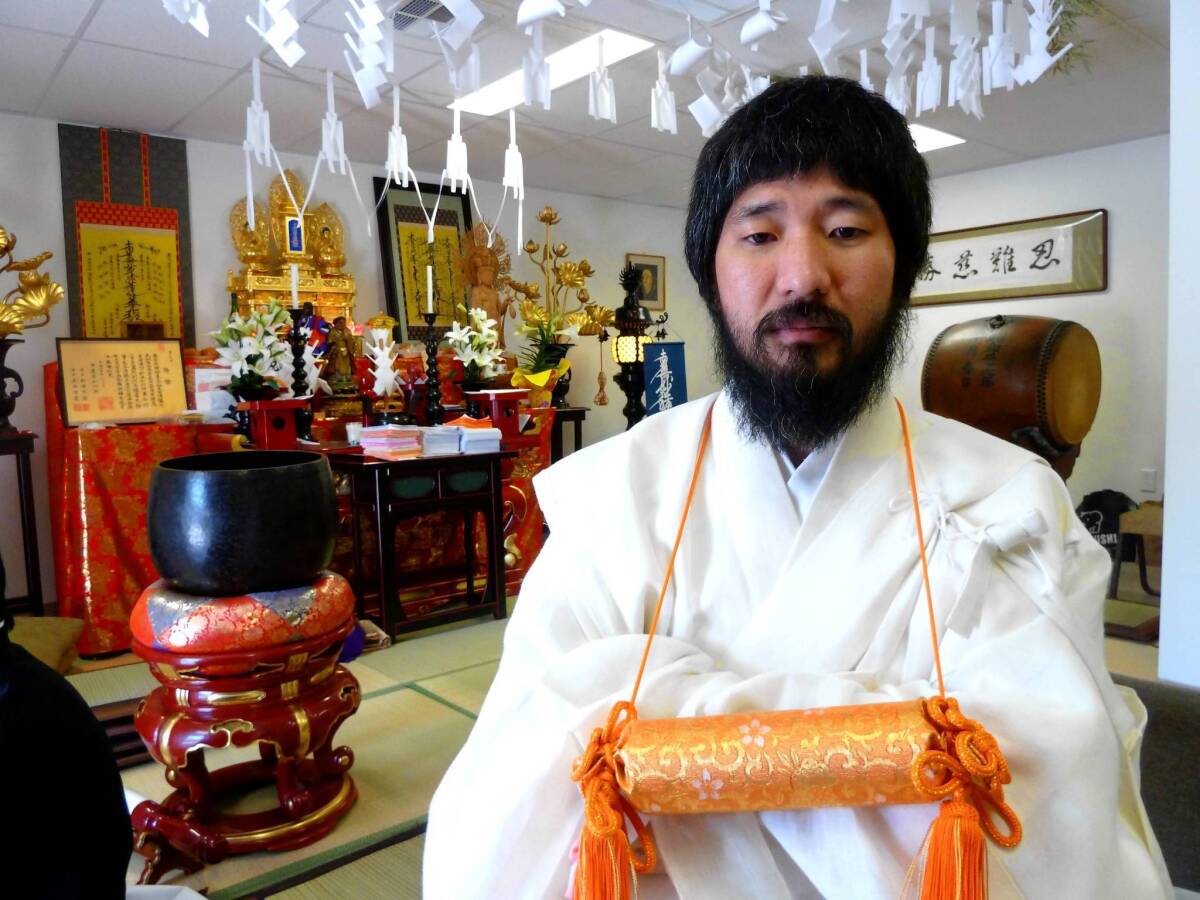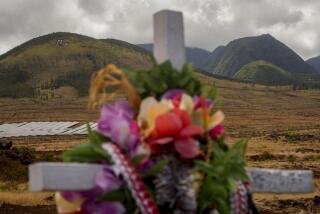Buddhist reverend in Vegas weathers the gamble of his life

LAS VEGAS — On a warm Sunday afternoon, the Rev. Douglas Kanai wore a serene expression as Buddhist followers surrounded him outside his new storefront temple, sandwiched between a used-car dealer and a tax preparer’s office.
But his stories were far from peaceful, and the scene he described was not desert Nevada but faraway Tokyo in the dead of winter. The gambling mecca’s roaring city traffic muffled his soft-spoken tales of physical endurance and a profound search for inner willpower that would eventually sustain him.
To prove he possessed the fortitude to lead his own Nichiren temple, Kanai had to endure a test known in Japan as the “100 days.” From November to February, the former Las Vegas casino worker and other recruits endured 21-hour days eating only rice gruel, kneeling and chanting for hours. Eventually, Kanai’s toes went numb and intolerable currents of pain shot up his legs.
“Each day started at 2:30 a.m. and ended at 11:45 p.m. — there were literally two days packed into each one,” he said.
At age 40, his hair is long, his face bearded. He wears an off-white hemp woven robe and awkward wooden sandals. He paused, as if reliving the moment, then added, “But before lights out, you had to rebandage your feet and pray you had the will to go on.”
Seven times a day, scores of recruits braved a water purification ritual. Standing naked in the freezing wind and snow, they poured cold water over their heads — officially to cleanse their souls, but realistically to weed out the weak.
One man died during the training, Kanai said, and 10 others “escaped” the temple turned prison, which was set among the bucolic bonsai and cherry trees of suburban Tokyo.
Kanai, born in Salt Lake City and the son of a Buddhist bishop, emerged as the first American-born recruit to complete the ruthless Nichiren ritual, which dates back 700 years in Japan.
On Sunday, during the opening of his new urban prayer space — known as the Nichiren Buddhist Kannon Temple of Nevada — Kanai re-created the water purification ceremony for several dozen followers, sharing his hard-earned spiritual energy and demonstrating his difficult path.
“Only he knows the torture he endured, but it seems worse than any military boot camp,” said Kathie Quinn, who drove from Los Angeles for the ceremony. “From what I understand, you need that kind of trauma to see what he saw — the good and the bad of his soul.”
Kanai’s Japanese-born father, Shokai Kanai, now 71, survived the same 100-day test three times decades ago. He administers a temple across town.
Although the younger Kanai was ordained as a Buddhist reverend after college, he decided to pursue another career. He worked in the import-export trade, and years ago followed his parents to Las Vegas, where he took a job in the casino back offices. Eventually he earned an MBA at the University of Nevada-Las Vegas.
But with his father then in his late 60s, Kanai realized the elder man’s loyal followers expected a transition to come from within the Kanai family. To take over his own temple, the young holy man knew he must face the 100 days.
Before the son’s departure, the father shared some advice: “You cannot say no,” Shokai Kanai recalled telling him. “Just like in the military, you must say: ‘Yes, sir. Yes, sir. Yes, sir.’”
The worst part of the ordeal, Douglas Kanai says, were the long hours spent kneeling, his frame arched back to rest on his feet. Weak from lack of sleep and sustenance, he chanted the Lotus Sutra and wondered whether he would faint from the pain. As he tried to position himself to relieve the agony, his minders criticized him for not chanting loudly enough.
“You had to find a way to ignore the pain,” Kanai recalls. “That was the challenge.”
Rumors circulated about those who couldn’t make it, who either asked their superiors for relief or slipped away when no one was looking. Often, recruits would find their ranks diminished with the new day.
Then came word of the death.
“You have to take a physical before you go in,” Kanai says. “There are problems from stress. You know there is a possibility of death, that what you are about to endure is so challenging that it could kill you.”
He remembers the man who didn’t make it. “We could all see that he was not well,” Kanai recalled. “Finally, they took him away to a hospital.”
The recruits learned of his demise when teachers “read a special prayer for the dead and they included his name” on the night he died.
It made Kanai look for signs that his own strength and sanity were ebbing. “I told myself that I would rather come back and fight another day, that I was of no help to anyone if I was dead,” he recalled.
Temple leaders tested Kanai, the only American, to see whether they could anger him enough that he would lash out — a lack of discipline they believe is present in most Americans. They hit and insulted him, but Kanai did not retaliate.
Over the days, Kanai came to accept the brutal rhythm of the regimen. But sometimes he weakened. He saw others steal away for catnaps, sneak nibbles of extra food as they cleaned in the temple kitchen. At first, he detested their weakness. Later, he found himself following their lead.
“I asked myself, ‘Am I going to Dumpster-dive like the others? What does that say about me?’”
He realized he had failures just like anyone else, he said.
Kanai, who returned to Las Vegas last week, says he can’t wait to shave off his beard. On Sunday, he stood before his temple with the satisfied look of a man who has been on a long, arduous ordeal, glad to have returned in one piece.
More to Read
Sign up for Essential California
The most important California stories and recommendations in your inbox every morning.
You may occasionally receive promotional content from the Los Angeles Times.











